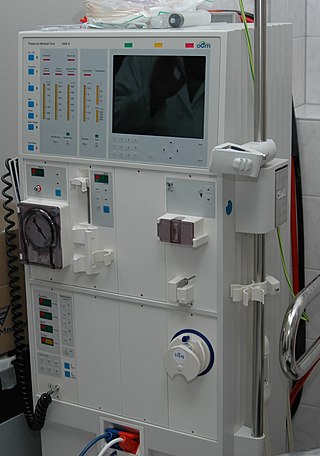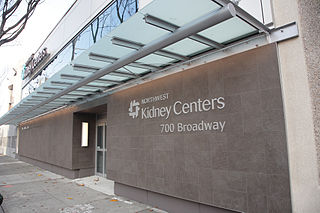
In humans, the kidneys are two reddish-brown bean-shaped blood-filtering organs that are a multilobar, multipapillary form of mammalian kidneys, usually without signs of external lobulation. They are located on the left and right in the retroperitoneal space, and in adult humans are about 12 centimetres in length. They receive blood from the paired renal arteries; blood exits into the paired renal veins. Each kidney is attached to a ureter, a tube that carries excreted urine to the bladder.
Nephrology is a specialty for both adult internal medicine and pediatric medicine that concerns the study of the kidneys, specifically normal kidney function and kidney disease, the preservation of kidney health, and the treatment of kidney disease, from diet and medication to renal replacement therapy. The word "renal" is an adjective meaning "relating to the kidneys", and its roots are French or late Latin. Whereas according to some opinions, "renal" and "nephro" should be replaced with "kidney" in scientific writings such as "kidney medicine" or "kidney replacement therapy", other experts have advocated preserving the use of renal and nephro as appropriate including in "nephrology" and "renal replacement therapy", respectively.

Kidney dialysis is the process of removing excess water, solutes, and toxins from the blood in people whose kidneys can no longer perform these functions naturally. This is referred to as renal replacement therapy. The first successful dialysis was performed in 1943.

Life support comprises the treatments and techniques performed in an emergency in order to support life after the failure of one or more vital organs. Healthcare providers and emergency medical technicians are generally certified to perform basic and advanced life support procedures; however, basic life support is sometimes provided at the scene of an emergency by family members or bystanders before emergency services arrive. In the case of cardiac injuries, cardiopulmonary resuscitation is initiated by bystanders or family members 25% of the time. Basic life support techniques, such as performing CPR on a victim of cardiac arrest, can double or even triple that patient's chance of survival. Other types of basic life support include relief from choking, staunching of bleeding by direct compression and elevation above the heart, first aid, and the use of an automated external defibrillator.

Kidney failure, also known as end-stage renal disease (ESRD), is a medical condition in which the kidneys can no longer adequately filter waste products from the blood, functioning at less than 15% of normal levels. Kidney failure is classified as either acute kidney failure, which develops rapidly and may resolve; and chronic kidney failure, which develops slowly and can often be irreversible. Symptoms may include leg swelling, feeling tired, vomiting, loss of appetite, and confusion. Complications of acute and chronic failure include uremia, hyperkalemia, and volume overload. Complications of chronic failure also include heart disease, high blood pressure, and anaemia.

Uremia is the term for high levels of urea in the blood. Urea is one of the primary components of urine. It can be defined as an excess in the blood of amino acid and protein metabolism end products, such as urea and creatinine, which would be normally excreted in the urine. Uremic syndrome can be defined as the terminal clinical manifestation of kidney failure. It is the signs, symptoms and results from laboratory tests which result from inadequate excretory, regulatory, and endocrine function of the kidneys. Both uremia and uremic syndrome have been used interchangeably to denote a very high plasma urea concentration that is the result of renal failure. The former denotation will be used for the rest of the article.

Chronic kidney disease (CKD) is a type of long-term kidney failure, in which either there is a gradual loss of kidney function occurs over a period of months to years, or abnormal kidney structure. Initially generally no symptoms are seen, but later symptoms may include leg swelling, feeling tired, vomiting, loss of appetite, and confusion. Complications can relate to hormonal dysfunction of the kidneys and include high blood pressure, bone disease, and anemia. Additionally CKD patients have markedly increased cardiovascular complications with increased risks of death and hospitalization.
Renal replacement therapy (RRT) is therapy that replaces the normal blood-filtering function of the kidneys. It is used when the kidneys are not working well, which is called kidney failure and includes acute kidney injury and chronic kidney disease. Renal replacement therapy includes dialysis, hemofiltration, and hemodiafiltration, which are various ways of filtration of blood with or without machines. Renal replacement therapy also includes kidney transplantation, which is the ultimate form of replacement in that the old kidney is replaced by a donor kidney.
Chapter Two of the Constitution of South Africa contains the Bill of Rights, a human rights charter that protects the civil, political and socio-economic rights of all people in South Africa. The rights in the Bill apply to all law, including the common law, and bind all branches of the government, including the national executive, Parliament, the judiciary, provincial governments, and municipal councils. Some provisions, such as those prohibiting unfair discrimination, also apply to the actions of private persons.
Security of the person is a basic entitlement guaranteed by the Universal Declaration of Human Rights, adopted by the United Nations in 1948. It is also a human right explicitly defined and guaranteed by the European Convention on Human Rights, the Constitution of Canada, the Constitution of South Africa and other laws around the world.
TheQueen Elizabeth Hospital (TQEH) is an acute care district general hospital in the western suburbs of Adelaide, South Australia., It was a teaching hospital of University of Adelaide, It provides a range of health services, including inpatient, outpatient, surgical, emergency and mental health services.

Northwest Kidney Centers is a regional, not-for-profit community-based provider of kidney dialysis, public health education, and research into the causes and treatments of chronic kidney disease. Established in Seattle in 1962, it was the world's first out-of-hospital dialysis provider. It offers dialysis throughout the greater Seattle area in 20 free-standing clinics, eight hospitals and its home dialysis program. It opened its first clinic in Everett in 2020, the organization's first in Snohomish county.

The right to housing is the economic, social and cultural right to adequate housing and shelter. It is recognized in some national constitutions and in the Universal Declaration of Human Rights and International Covenant on Economic, Social and Cultural Rights. The right to housing is regarded as a freestanding right in the International human rights law which was clearly in the 1991 General Comment on Adequate Housing by the UN Committee on Economic, Social and Cultural Rights. The aspect of the right to housing under ICESCR include: availability of services, infrastructure, material and facilities; legal security of tenure; habitability; accessibility; affordability; location and cultural adequacy.

Government of the Republic of South Africa and Others v Grootboom and Others is an important case in South African law, heard in the Constitutional Court on 11 May 2000, with judgment handed down on 4 October.
South African jurisprudence refers to the study and theory of South African law. Jurisprudence has been defined as "the study of general theoretical questions about the nature of laws and legal systems."
South African administrative law is the branch of public law which regulates the legal relations of public authorities, whether with private individuals and organisations or with other public authorities, or better say, in present-day South Africa, which regulates "the activities of bodies that exercise public powers or perform public functions, irrespective of whether those bodies are public authorities in a strict sense." According to the Constitutional Court, administrative law is "an incident of the separation of powers under which the courts regulate and control the exercise of public power by the other branches of government."

The South African judiciary has broad powers of judicial review under the Constitution of South Africa. Courts are empowered to pronounce on the legality and constitutionality of exercises of public power, including administrative action, executive action, and the passage of acts of Parliament. Though informed by the common law principles that guided judicial review during the apartheid era, contemporary judicial review is authorised by and grounded in constitutional principles. In the case of administrative action, it is also codified in the Promotion of Administrative Justice Act, 2000.

The National Kidney Foundation Singapore (NKF) is a non-profit health organisation in Singapore. Its mission is to render services to kidney patients, encourage and promote renal research, as well as to carry out public education programs on kidney diseases. As of February 2016, NKF has 29 dialysis centres in Singapore.

Mark Dominik Alscher is a German physician, managing director of Bosch Health Campus Stuttgart and distinguished professor at University of Tübingen. He is known for his work in the field of peritoneal dialysis, acute renal failures and medical expert systems.

Mazibuko and Others v City of Johannesburg and Others is a landmark decision of the Constitutional Court of South Africa concerning the content of the constitutional right of access to water. It was decided on 8 October 2009 in a unanimous judgment, the last written by Justice Kate O'Regan before her retirement.












